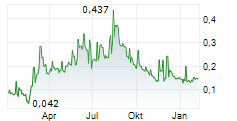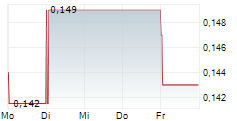
STOCKHOLM, SWEDEN / ACCESS Newswire / February 24, 2025 / AlzeCure Pharma (STO:ALZCUR)(FRA:AC6) AlzeCure Pharma AB (publ) (FN STO:ALZCUR) ), a pharmaceutical company that develops candidate drugs for CNS diseases, focusing on Alzheimer's disease and pain, announced today that a scientific article has been published with novel preclinical data about Alzstatin, the biological effects that could be achieved by the treatment, and the interesting opportunities this brings in the continued development of the drug candidate ACD680.
The article, titled ?-Secretase Modulation inhibits Amyloid Plaque Formation and Growth and stimulates Plaque Regression in APP/PS1 Mice , has been published online in The Journal of Pharmacology and Experimental Therapeutics (JPET) and is written by Gunnar Nordvall, PhD and Director of Medicinal Chemistry at AlzeCure Pharma. Co-authors include Johan Lundkvist and Johan Sandin, as well as several academic researchers, including Swedish professors Henrik Zetterberg and Bengt Winblad, and ProfessorJohn Cirrito and Professor Jin-Moo Lee from Washington University.
The published article contains new preclinical data from both cellular model systems and animal models showing that substances in the Alzstatin project, so-called gamma-secretase modulators, reduce the production of toxic amyloid-beta 42 protein (Aß42), which is the building block of the amyloid plaques found in the brains of Alzheimer's patients. In addition, the production of shorter Aß peptides, e.g. Aß37 and Aß38, which have been reported to have protective effects and, among other things, can reduce the aggregation of Aß42, is increased. The results also show that gamma-secretase modulators can stop the growth and reduce the amount of amyloid plaques in the brain in animal models.
"The publication demonstrates a new unique mechanism of action of gamma-secretase modulators such as ACD680, which opens up possibilities both as a single treatment, but also as a combination treatment with antibodies. Alzstatin has a number of unique advantages as a potential treatment for Alzheimer's and we hope that this publication will further clarify this," said Gunnar Nordvall, Director of Medicinal Chemistry at AlzeCure Pharma.
"This article describes a new mechanism in an area that is generating a lot of interest right now, including as a treatment that potentially could prevent Alzheimer's disease. Additionally, the advantages of these small molecule drugs include that the substance can be taken as a tablet at home and is produced at a much lower cost compared to biological drugs," said Martin Jönsson, CEO of AlzeCure Pharma. "The fact that a gamma-secretase modulator project now has initiated phase II studies further strengthens the validity of its mechanism, and this in a field where we still have a huge unmet medical need."
The article is now available online via the following link: https://www.sciencedirect.com/science/article/pii/S0022356525396138
For more information, please contact
Martin Jönsson, CEO
Tel: +46 707 86 94 43
martin.jonsson@alzecurepharma.com
About AlzeCure Pharma AB (publ)
AlzeCure® is a Swedish pharmaceutical company that develops new innovative drug therapies for the treatment of severe diseases and conditions that affect the central nervous system, such as Alzheimer's disease and pain - indications for which currently available treatment is very limited. The company is listed on Nasdaq First North Premier Growth Market and is developing several parallel drug candidates based on three research platforms: NeuroRestore®, Alzstatin® and Painless.
NeuroRestore consists of two symptomatic drug candidates where the unique mechanism of action allows for multiple indications, including Alzheimer's disease, as well as cognitive disorders associated with traumatic brain injury, sleep apnea and Parkinson's disease and is being prepared for phase 2. The Alzstatin platform focuses on developing disease-modifying and preventive drug candidates for early treatment of Alzheimer's disease and comprises two drug candidates. Painless is the company's research platform in the field of pain and contains two projects: ACD440, which is a drug candidate in the clinical development phase for the treatment of neuropathic pain with positive phase 2 results, and TrkA-NAM, which targets severe pain in conditions such as osteoarthritis. AlzeCure aims to pursue its own projects through preclinical research and development through an early clinical phase, and is continually working on business development to find suitable outlicensing solutions with other pharmaceutical companies.
FNCA Sweden AB is the company's Certified Adviser. For more information, please visit www.alzecurepharma.se.
About Alzstatin ®
AlzeCure's disease-modifying research platform, Alzstatin, consisting of disease-modifying and preventive drug candidates, focuses on reducing the production of toxic amyloid beta (Aß), such as Aß42, in the brain. Aß42 plays a key pathological role in Alzheimer's and begins to accumulate in the brain years before clear symptoms develop. The drug candidates in the Alzstatin platform modulate the function of the enzyme gamma secretase. Gamma secretase acts like a pair of scissors and cuts Aß42 out from a longer protein known as APP. The sticky Aß42 clumps together giving rise to the amyloid plaque so typical of Alzheimer's disease. The candidates in the Alzstatin platform affect enzyme function so that it instead cuts out shorter forms of the Aß peptide, Aß37 and Aß38, which in addition to them not being sticky and not forming aggregates, also have a restrictive effects on Aß42 aggregates already formed. In addition, new data show that treatment with gamma-secretase modulators reduces the deposition of amyloid plaques in the brain. This means the drug candidates in the Alzstatin platform have several separate but synergistic effects that together contribute to a stronger anti-amyloidogenic - and thus more potent - disease-modifying effect. This specific mechanism of action differentiates it from biological therapies, e.g. antibodies. Moreover, small molecules such as Alzstatin, have several other advantages, including easy and non-invasive administration as tablets or capsules. Small molecules will also generally pass more readily through the blood-brain barrier to reach its target, the brain.
About Alzheimer's disease
Alzheimer's disease is the most common form of dementia, affecting approximately 55 million people worldwide. Alzheimer's disease is a lethal disorder that also has a large impact on both relatives and the society. Today, preventive and disease modifying treatments are missing. The main risk factors to develop Alzheimer's are age and genetic causes. Even though the disease can start as early as between 40 and 65 years of age, it is most common after 65 years. Significant investments in Alzheimer research are being made because of the significant unmet medical need and the large cost of this disease for healthcare and society. The total global costs for dementia related diseases is estimated to about 1,300 billion USD globally in 2019. Given the lack of both effective symptomatic treatments and disease modifying treatments, the need for new effective therapies is acute.The few approved drugs on the market today have only a limited symptomatic effect and can produce dose limiting side effects. A disease modifying treatment for Alzheimer's disease is estimated to reach more than $15 billion in annual sales. In Sweden, approximately 100,000 people suffer from Alzheimer's disease with a healthcare cost of about SEK 63 billion yearly, which is more than for cancer and cardiovascular diseases combined.
Image Attachments
Martin Jönsson And Gunnar Nordvall AlzeCure Pharma
Attachments
New article showing the unique mechanism of action behind Alzstatin as an Alzheimer's treatment
SOURCE: AlzeCure Pharma
View the original press release on ACCESS Newswire



